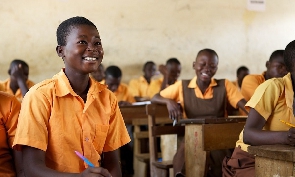 Comprehensive Sexuality Education (CSE) to be introduced to basic school pupils
Comprehensive Sexuality Education (CSE) to be introduced to basic school pupils
There is a heated debate in Ghana on the guidelines for the new Comprehensive Sexuality Education (CSE) curriculum for basic schools which will be introduced by the year 2020.
The guidelines meant to equip pupils to know and experience their sexuality has been described as a deliberate attempt to introduce homosexuality to Ghana.
This is informed by portions of the guidelines that touch on lesbian, gay, bisexual, and transgender (LGBT) identification which lawmakers, clergy and the Ghanaian public are calling inappropriate for toddlers and young Ghanaians.
The Ghana Education Service (GES) has allayed the fears of the concerned in a statement on Monday saying the programme has not been approved yet for schools in the country.
"The GES is a state agency and will not under any circumstance implement any programme which goes contrarily to the legal, cultural norms, values and beliefs of the Ghanaian people,” it stated.
However, Ghana is not the first African country to reject the new curriculum introduced globally by Unesco.
Nigeria
In 2017, Nigerians were divided on the introduction of the CSE curriculum in schools to give students an understanding of their sexuality.
Nigeria’s CSE curriculum is known as family life HIV education and is designed to prevent students from contracting sexually transmitted infections including HIV, reduce teenage pregnancy and lower rates of sexual violence.
The CSE brought forth text books for the government and private primary and secondary school students with lessons on abstinence and other sexuality topics. The children are between the ages of eight and 15.
One of such books is the Junior Secondary School (JSS 1) Social Studies textbook written by S. O. Omotuyole.
This book has been condemned for its content on Page 50 that spells out “ways to give and receive sexual pleasure and develop closeness without sexual intercourse”.
Among the answers for the topic on abstinence in the book are: kissing, hugging and the undesirable “mutual masturbation”.
One parent, Bello Abdullahi, expressed concern on Facebook about the text book and called on other parents to protect their children and educate them according to the “scriptures”.
“We must keep a close watch on what is being taught our children at school and re-educate them in line with scriptures. Please alert other parents and let’s protect our children,” he said.
He received a diverse response from the public as some blamed the country’s educational board for the publication while others believe the time is right for sexual education.
The NGO Association of Concerned Mothers (ASCOM) had petitioned the Ministry of Education to withdraw the textbook for its “unwholesome and dangerous ideology.”
Also, the National Association of Proprietors of Private Schools (NAPPS) launched a campaign in July 2017 against the comprehensive sex education in schools to rather “impact moral values in the children”.
Meanwhile, reproductive health body IPAS has supported the introduction of CSE to reduce incidences of rape among children.
The Country Director of IPAS Nigeria, Hauwa Shekarau, said last week that adolescents need to be equipped with information to prevent them from the various consequences of unprotected sex.
“Comprehensive sexuality education is not a taboo. Young people should be able to acquire sex education the appropriate way. If you don’t tell them the right things, they will get the information, whether right or wrong, elsewhere,” she said.
The debate has died down and Nigerians have accepted the curriculum without knowing it.
Uganda
The Ugandan government in 2017 also approved the teaching of sex education which will begin from preschool to the tertiary education level.
Preschoolers between the ages of three and five are taught about “body parts, private parts and unacceptable forms of touching the body”, Education Ministry undersecretary Aggrey Kibenge told local media in 2017.
He justified the teaching of three-year olds sex education saying it will develop the child’s awareness, refusal and communicative skills to be responsible citizens.
Kibenge explained that every student in the school system will be taught sex education as they have been grouped in five and each will have its curriculum developed by the National Curriculum Development Centre.
The other groups are the lower primary students (six to nine years old) who will be taught privacy, puberty and pregnancy; upper primary (10 to 12 years old) who will be taught personal hygiene during puberty, virginity and abstinence; secondary school students (13 to 16 years) and tertiary institution students (17 years and above).
The groupings were highlighted in a report that says: “young people at 3-5 years also engage in exploratory sexual play that may include gender roles and behaviours.”